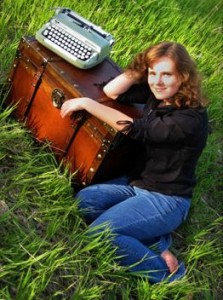 By the time I realized the art of writing a novel was something that could actually be learned, I had already written three (admittedly awful) books. Then, one day, when I was about halfway through my fourth book, I happened to be browsing the bottom shelves at the library, where I pulled out a book titled How to Write (And Sell) a Christian Novel.
By the time I realized the art of writing a novel was something that could actually be learned, I had already written three (admittedly awful) books. Then, one day, when I was about halfway through my fourth book, I happened to be browsing the bottom shelves at the library, where I pulled out a book titled How to Write (And Sell) a Christian Novel.
I checked the book out, polished it off in one or two sittings, and closed the back cover to the realization that my writing—and my life—had changed forever. I checked out a few more books from that bottom shelf. But around the third or fourth one I decided they were all the same, and, anyway, I had it all figured out by now. So I quit reading them and buckled down to finish writing Book #4. It was also awful.
This is about when I started thinking, Hmm, maybe I don’t know it all yet. Maybe I should keep reading those bottom-shelf books after all.
The more time we spend studying our craft and the more we learn, the easier it is to lose sight of our own fallibility.
We master a little corner of the craft and immediately start feeling like Superman, floating out there in space, complacently smiling down at the world, congratulating ourselves for saving it once again. We read a book by another author, start picking out the mistakes (which, only a few weeks ago, we were making ourselves), and smugly pat ourselves on the backs for being experts compared to this poor fool.
The truth is we probably do know a good deal about the craft. We’ve studied, we’ve grown, maybe we’re even experts. But the moment we start thinking of ourselves as experts (explicitly or otherwise) is the moment in which we lose a little of our wide-open learnability. A naïve, arrogant, deep-down part of us starts to think we understand it all.
Every time I start falling into that trap, something eventually comes along that bangs me upside the head and leaves me with the star-spangled reminder, “I don’t know anything!”
We all need to experience this painful, shocking, overwhelming epiphany every now and then.
This epiphany can leave us feeling a little abashed, a little ashamed, and, ironically, more than a little exhilarated. Stone walls and iron chains fall away. New vistas explode, and unexplored horizons stretch to infinity. Blind spots flicker into view, and, even as the painful awareness of our writing weaknesses caused us to wince, we can laugh with the excitement of realizing that being able to see our problems means we’re halfway down the road to solving them.
Success, knowledge, and experience can sometimes lead us, unwittingly, to the stuffy cell of complacency. And in a life—and an art—that demands openness and curiosity, this is death in a box. No matter where we are in our writing lives, no matter how many bad stories we write, no matter how many good stories we write, no matter how much we’ve learned or how much we’ve mastered—we still don’t know anything.
No one can be an expert at writing, anymore than he can be an expert at life. Our journey toward mastery is a never-ending road, and the moment we start thinking we know everything, or even most of everything, is the moment we stop traveling forward. Never stop learning, never believe you’ve achieved mastery. Always remember that your next big revelation is around the corner, waiting for you so long as you keep looking for it.
I’m honored to be able to share that journey with you here on Life as a Human. In the future, we’ll be exploring the ups and downs of the writing life and the ins and outs of the craft. I write historical and speculative fiction and mentor authors through my blog posts, articles like this one, and my writing craft books, such as Outlining Your Novel: Map Your Way to Success. I hope you’ll come along with me on this exciting ride. Maybe we’ll teach each other a thing or two!
Here’s to the journey. Here’s to not knowing anything. And here’s to never mastering this beautiful, crazy art of the written word.
Photo Credit
Photo is © K.M. Weiland
Previously published on Wordplay: Helping Writers Become Authors


Wise, wonderful words. Thank you so much for boldly declaring the unmitigated truth: none of us knows anything about anything. How freeing is that, knowing there’s always more to learn and discover?
I’m so looking forward to your next chapter…
Once we figure out our own ignorance, it opens so many opportunities for growth. The only time we stagnate is when we think we’ve got it all figured out – and don’t. The best state of mind we can be in is to know we don’t know!
Yay! Another place I can visit for your excellent writing advice. Humility is good. It helps us to keep our focus where it belongs: on craft and continual improvement 🙂 Great post.
Thanks for stopping by, Melanie! I’m glad you enjoyed the post.